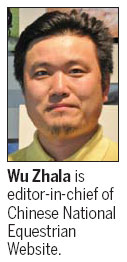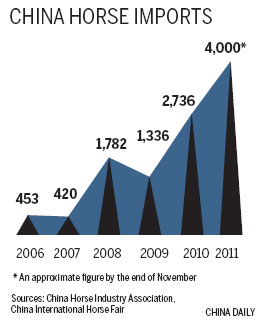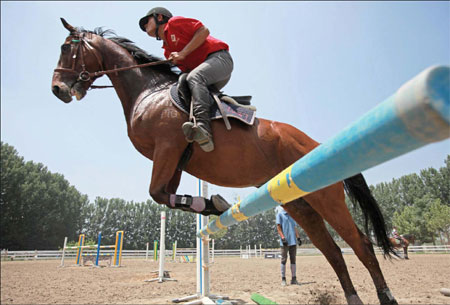Nation rides a new passion
Updated: 2012-07-13 12:33
By Zhao Yanrong (China Daily)
|
|||||||||||
|
Equestrian sport, like golf and yachting, has become popular among the affluent Chinese. Wang Jing / China Daily |
 |
Throughout China's storied history, the horse has been integral to the nation's longevity. Few people probably realize that the Chinese invented the stirrup to use the animal in their military, farms and transport. It was customary for horses to be entombed with their owners. Today equestrianism is taking on a different but growing significance. With the advent of the nation's upper crust of wealthy individuals, horses are once again highly prized as the affluent seek image-enhancing outlets of entertainment, along with playing golf or cruising in a yacht.
More and more equestrian clubs are popping up in major cities and there are now nearly 200 in Beijing.
And though China will not be competing in any equestrian competition in the London Olympics, there is budding market demand for investments by international equestrian organizations as well as for domestic equine medical services, training centers and professional horse riders.
But, most surprisingly, there is high demand for internationally bred horses, even though the nation has 7.2 million of its own horses, the second-highest number in the world after the United States.
"After golf and yachting, equestrian is a new interest that leads the recreation market for the Chinese wealthy," says Wu Zhala, editor-in-chief of the Chinese National Equestrian Website.
After China hosted equestrian competitions in Hong Kong for the 2008 Beijing Olympics, the interest in horse riding blossomed, Since then, according to Wu, China has become the largest importer of horses.
Between 2007 and 2011, imports of horses increased 10-fold to 4,000, the China Horse Industry Association says. The reason why Chinese riders and centers are not using their own native horses is that the speedy Chinese horses are not adept at jumping, Wu says.
 |
"The sport is from Europe, so only horses from Europe are suitable for competitions. The increasing popularity of equestrianism has created a huge demand for imports," Wu says.
He estimates that about 470,000 Chinese equestrian lovers across the country participate in the sport every year. Many are buying their own horses at steep prices.
The prices of international horses vary according to breed. Warmbloods, which are middle-weight horses that originate from Europe, cost from 2,000 euros ($if they are not trained to more than 10 million euros for those that have won titles in international competitions.
To sate the need for more international breeds, overseas stud farms are entering the mainland market.
Jack Lubbers, sales manager for VDL Stud - a breeder under KWPN, the Royal Warmblood Studbook of the Netherlands - says Chinese clients are eager to learn about the European way of handling, show jumping and dressage.
VDL has exported its horses to more than 70 countries and has sold more than 200 horses to individual Chinese riders and riding clubs.
| ||||
In April Irish newspaper the Independent reported that the bloodstock giant Coolmore made a groundbreaking deal to set up an equine center in Tianjin with more than 100 thoroughbred breeding mares from Ireland.
China's local governments and companies have also created more opportunities for riders this year.
"Many local governments, such as the Inner Mongolia autonomous region, are investing in tourism-related equestrian clubs and competitions in western China this year as a new growth driver," says Chang Wei, former secretary-general of the Chinese Equestrian Association.
Shandong Highway Engineering Construction Group Co, in Jinan, Shandong province, and which had never been involved in equestrianism, invested 4.6 million yuan ($722,000, 590,000 euros) to transform an old local horse racing court in Jinan into an equestrian club, Jinan Daily reported in May.
"Unlike private investors, big corporations have considerable funds that can sustain the industry's continuing growth," says Chang, who was also director of the equestrian events at the Beijing Olympics.
The China International Horse Fair in Shanghai is an example of the nation's growing interest in horse-riding. More than 82 companies from 18 countries and regions attended the exhibition last year, accounting for more than 70 percent of the exhibitors.
Organizers expect this year's event in September to draw more than three times the number of exhibitors.
"There will be more horse buyers coming to our exhibition this year, since many provincial equestrian teams will buy horses to train and compete at the National Games next year," says Gu Shiqi, general manager of Yubo Group, which is organizing the exhibition. Gu says warmbloods, worth about 1.2 million yuan each, will be in high demand.
To meet the strong demand in the Chinese market, hundreds of equestrian centers and horse-riding clubs have been built over the past five years. According to the China Horse Industry Association, the number of horse riding clubs have jumped from less than 100 to more than 500 since 2007. At the 200 or so clubs in Beijing, annual membership fees range from 50,000 yuan to 200,000 yuan.
As with other budding industries in China, problems exist. Chang says the country lacks professional breeders, coaches, riders, stables, facilities, veterinary centers and equine medicines.
"When most horses in the industry are imported, European equestrian knowledge and professional personnel, such as high-level trainers and managers, are not provided. That is crucial for the development of the clubs' business," he says.
Many international horse dealers, Chang says, mainly concern themselves with the sales of horses and do not provide enough after-sales services, such as handing down knowledge about how they train, coach and care for the horses.
Without professional training, Chang says, young horses imported to China at the age of 2 or 3 at the cost of millions of yuan will be unable to perform in equestrian competitions and wind up being a waste of money.
"We realize that the Chinese are not only interested in the horses but also training," says Irene Wolfs, director of foreign affairs at KWPN. "Therefore we established a foundation, the Holland National Horse Foundation."
The foundation brings together a number of different Dutch companies to provide horse feed and personnel who can build stables, sell horse trucks and provide veterinarian care and training. Many offer insurance on the horses and help organize equestrian events in China, she says.
Wu from the equestrian website says that Chinese buyers must also commit long term to having a horse, adding that many Chinese buyers will have acquired information about their horses by following other buyers with overseas experience without seeking their own information.
"Similar horses can be priced very differently from various horse dealers," Wu says. "We hope an official trade mechanism can be framed with horse associations setting up offices in China."
Industry insiders say the equestrian market will soon reach its peak in terms of importing horses. Those who spoke to China Daily say that breeding European horses and training more equestrian professionals are the key for future international horse institutions in China.
"Horse import's costs a lot of money in customs duty and international transport, and some Chinese horse experts are working on projects in which a few kinds of European horses are bred in China, reducing the cost of high-end horses," Wu says.
The Chinese government has so far not introduced regulations for the equestrian industry. Many insiders say that a certification system for Chinese trainers is badly needed.
"We cannot totally borrow the Western system, which is not 100 percent suitable for the Chinese market," Wu says.
A few Chinese universities are now offering courses in equestrianism, but Wu says more graduates educated in equestrianism are needed.
"For international horse organizations and companies that contribute the most to equestrian education in China, they are the future of the Chinese market."
zhaoyanrong@chinadaily.com.cn
(China Daily 07/13/2012 page12)
Today's Top News
Rescuers race against time for quake victims
Telecom workers restore links
Coal mine blast kills 18 in Jilin
Intl scholarship puts China on the map
More bird flu patients discharged
Gold loses sheen, but still a safe bet
US 'turns blind eye to human rights'
Telecom workers restore links
Hot Topics
Lunar probe , China growth forecasts, Emission rules get tougher, China seen through 'colored lens', International board,
Editor's Picks

|

|

|

|

|

|








